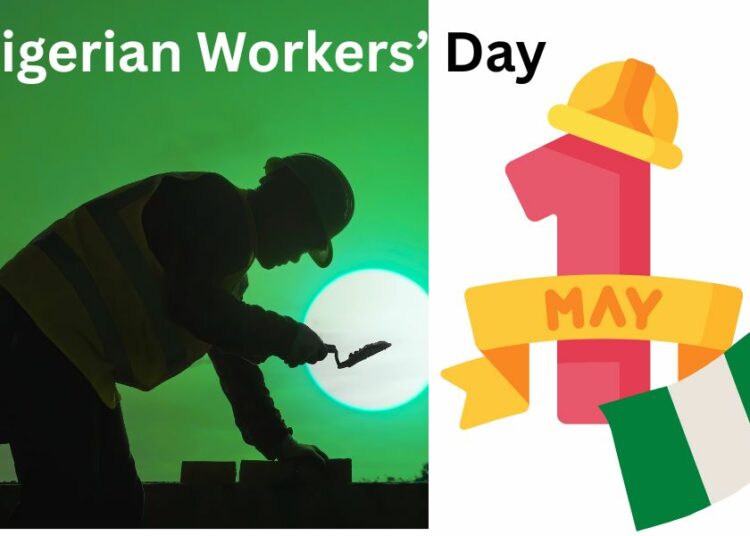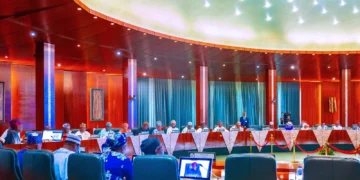Last Thursday was yet another Workers’ Day and as expected, flowery speeches flew from Aso Rock like confetti at a carnival. President Bola Tinubu praised Nigerian workers as “the engine of our economy” while the First Lady called them “the backbone of the nation’s progress.”
These are beautiful words that would warm the heart – if only they matched the reality on the ground.
Let’s be honest, shall we? Nigerian workers deserve more than annual platitudes. Every May Day, we witness this ritual where political leaders dust off the same template speeches, insert a few new adjectives, and deliver them with straight faces. “You are the engine of our economy,” says the
President. But engines need fuel to run, and most Nigerian workers are running on empty.
The irony isn’t lost on anyone. While workers are being praised as “central to the nation’s development,” many can barely afford to put food on their tables. The minimum wage debate has dragged on interminably, with inflation eating away purchasing power faster than government committees can deliberate on wage increases.
My thoughts on this? These speeches score high on rhetoric but low on substance. The President promises to “prioritise workers’ welfare” and build “a more inclusive, fair, and productive economy.” Noble intentions, certainly. But intentions without concrete action plans are just political cotton candy – sweet to hear but lacking nutritional value.
What workers need isn’t poetic descriptions of their importance but tangible improvements in their living conditions. What’s the administration’s blueprint for addressing the soaring inflation that has turned salaries into pocket change? How does the government plan to create the millions of jobs needed for our unemployed youth?
Come to think of it, shouldn’t we be discussing the alarming rate at which professionals are leaving the country? Nigeria is experiencing a brain drain of epic proportions. Doctors, nurses, engineers, and teachers are fleeing in droves, seeking greener pastures abroad.
This exodus is a damning indictment of our work environment and compensation structure.
The First Lady spoke about “creating opportunities that are fair and inclusive.” Valid point. But the question is: how has this rhetoric translated into reality for the common man? When will the Nigerian worker begin to feel these fair and inclusive opportunities in their bank accounts and living standards?
Okay, let’s put it this way. The average Nigerian worker wakes up at 5 am, battles nightmarish traffic, works under challenging conditions, and returns home exhausted – only to face electricity bills they can barely afford and school fees that keep rising. They do this month after month, year after year. And what do they get in return? Speeches that celebrate their “resilience” – a euphemism for their capacity to endure unnecessary hardship.
However, some have argued that we should give the current administration time to implement their policies. They say economic reforms take time to bear fruit. Fair enough. But workers can’t eat time or feed their children with patience.
While waiting for economic policies to mature, people need to survive.
I strongly suggest that instead of flowery speeches, the government should focus on immediate relief measures. Reduce the cost of governance. Cut down on frivolous expenditures. Channel those savings into subsidising essential services like healthcare, education, and public transportation. These steps would bring immediate relief to workers struggling to make ends meet.
Consequently, labour unions need to step up their game as well. They should be more than just annual negotiators for wage increases. They should advocate for comprehensive welfare packages, including health insurance, housing schemes, and retirement benefits that allow retirees to live in dignity.
The truth is no speech, no matter how eloquent, can substitute for concrete action. Workers don’t need to be told they are valuable; they need to be shown through policies and programmes that improve their lives tangibly.
Politicians on both sides of the divide need to understand that workers’ welfare is not a partisan issue but a national imperative. Rhetorical flourishes and subtle platitudes will not put food on workers’ tables.
Indeed, there should be genuine sincerity in the government’s commitment to workers’ welfare. It should not be limited to May Day speeches but reflected in daily governance decisions and policy implementations.
Besides, we should not make the mistake of thinking once we have a new minimum wage, all will be well. The most important aspect of workers’ welfare which we often overlook is creating an enabling environment where businesses can thrive, thereby creating more jobs and opportunities. Till we begin to have good policies that stimulate economic growth, improved minimum wage or not, El Dorado will be a mirage for Nigerian workers.
As we mark this Workers’ Day, let’s move beyond the speeches and promises. Let’s demand concrete action plans with timelines and measurable outcomes. Nigerian workers deserve more than just being called “the backbone” of the nation – they deserve to stand tall with dignity, supported by policies that truly recognise their worth.





